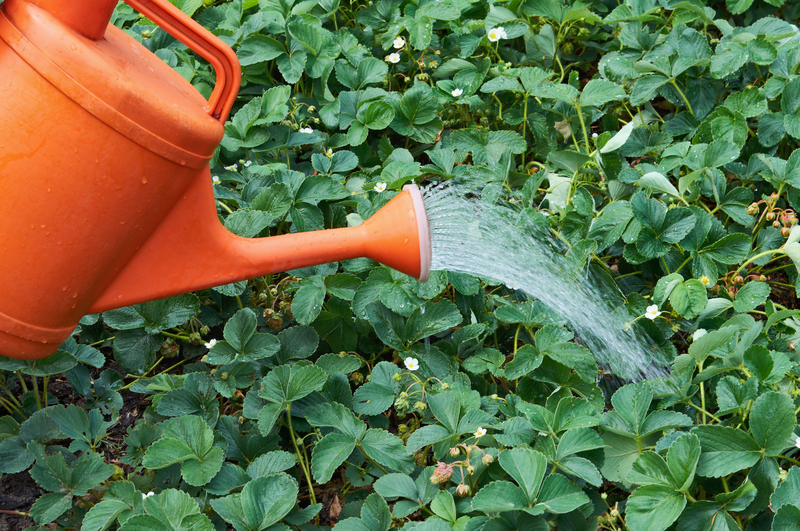Learn how eco-friendly gardening fights the climate crisis
Posted on 19/06/2025
Learn How Eco-Friendly Gardening Fights the Climate Crisis
Looking for ways to make a positive impact on the environment from your own backyard? Eco-friendly gardening offers a direct, meaningful way to address the climate crisis by embracing sustainable techniques that promote healthy ecosystems. In this comprehensive guide, you'll discover how climate-smart gardening practices can dramatically reduce your carbon footprint while fostering a vibrant, resilient landscape that benefits both people and planet.

What Is Eco-Friendly Gardening?
Eco-friendly gardening--also known as sustainable gardening or climate-friendly gardening--focuses on working with nature to create a thriving garden that requires fewer resources and minimizes waste and pollution. This approach puts an emphasis on:
- Utilizing organic methods to grow healthy plants
- Supporting pollinators and beneficial insects
- Reducing energy and water consumption
- Building soil health and sequestering carbon
- Avoiding harmful chemicals and synthetic fertilizers
Eco-conscious gardening goes beyond aesthetics: It makes your green space a vital ally against climate change.
How Does Eco-Friendly Gardening Help Fight Climate Change?
The gardening choices you make matter. By adopting sustainable gardening practices, you can:
- Reduce greenhouse gas emissions
- Enhance carbon sequestration in soil and plants
- Support biodiversity and ecological resilience
- Alleviate urban heat island effects
- Manage stormwater and prevent pollution runoff
1. Sequestering Carbon Through Soil and Plants
Soil is one of the planet's most significant carbon sinks. When you use regenerative gardening practices, such as composting and mulching, you help trap carbon dioxide (CO2) in the ground--a process known as carbon sequestration. This removes CO2 from the atmosphere, one of the key drivers of the climate crisis.
- Adding organic matter like compost boosts the soil's ability to store carbon
- Planting trees, shrubs, and perennial plants also sequesters more carbon over time
2. Decreasing Greenhouse Gas Emissions
Sustainable gardening slashes emissions by:
- Minimizing the use of gas-powered equipment like mowers and blowers
- Choosing hand tools or electric alternatives
- Reducing reliance on synthetic fertilizers and pesticides, which are energy-intensive to produce and release nitrous oxide, a potent greenhouse gas
By adopting these habits, your climate-friendly garden becomes a net reducer of harmful emissions.
3. Supporting Biodiversity for Ecosystem Resilience
Healthy, biodiverse ecosystems are more resilient to the impacts of climate change. Eco-conscious gardening invites a wide variety of flora and fauna, creating a living web that resists pests, diseases, and climate extremes.
- Use a mix of native plants to provide habitat for pollinators and beneficial insects
- Avoid monocultures (large areas of only one plant species)
- Build layers and diversity into your planting design
Sustainable Gardening Practices That Make a Difference
Ready to transform your outdoor space into a force for positive environmental change? Here are the most effective and easy-to-adopt ways to practice eco-friendly gardening:
1. Composting: Turning Waste Into Climate Action
Composting is the cornerstone of climate-resilient gardening. When you compost your kitchen scraps and yard waste, you:
- Reduce methane emissions from landfills
- Build soil structure and fertility
- Retain moisture, thereby reducing irrigation needs
- Encourage healthy root systems for plants, which further sequester carbon
Start a backyard compost pile or use a compost bin to make the most of food scraps, leaves, and even shredded cardboard.
2. Mulching for Moisture Retention and Temperature Regulation
Applying mulch around your plants:
- Cuts back on water evaporation
- Moderates soil temperature during heat waves and frosts
- Suppresses weeds naturally
- Adds organic matter as it breaks down, boosting carbon storage
Shredded leaves, wood chips, and straw are all excellent eco-friendly mulch options.
3. Water-Smart Gardening
- Opt for drought-tolerant or native plants to minimize watering
- Install rain barrels to capture runoff for irrigation
- Mulch and amend soil to improve water retention
- Water in the early morning or evening to reduce evaporation losses
Using less water, especially in arid regions, is crucial for both environmental and climate resilience.
4. Native and Pollinator-Friendly Plantings
- Native species require fewer resources and are adapted to local climates
- They provide food and shelter for bees, butterflies, and other pollinators
- Diverse planting supports beneficial insects that naturally control pests
By planting for pollinators, your sustainable garden actively supports life and boosts ecological health.
5. Reducing, Reusing, and Recycling in the Garden
- Repurpose containers and building materials when possible
- Avoid single-use plastics and opt for biodegradable or recycled products
- Fix and maintain gardening tools for longer lifespans
Sustainability in gardening is about being thoughtful with resources at every step.
How to Start an Eco-Friendly Garden
Whether you're tending to a small balcony or an expansive backyard, anyone can create a climate-friendly garden. Here is a step-by-step approach to get you started:
- Assess Your Space: Survey your garden's sunlight, soil type, and water access. Identify areas for improvement and what plants suit your local conditions.
- Choose Climate-Appropriate Plants: Select drought-resistant, native, or climate-adapted species. These plants thrive with less water and maintenance, making them ideal for eco-conscious gardening.
- Build Healthy Soil: Start composting and routinely add organic matter. Avoid removing fallen leaves--they enrich the soil naturally.
- Limit Chemicals: Use natural fertilizers and biological pest controls. Encourage natural predators instead of spraying pesticides.
- Conserve Water: Set up efficient irrigation systems like drip lines, use mulch, and collect rainwater.
- Encourage Wildlife: Add features like bird baths, bee hotels, or small ponds to support local fauna.
Every action--no matter how small--contributes to a larger shift towards solutions for the climate crisis.
The Role of Urban Eco-Friendly Gardening
Urban environments are particularly vulnerable to climate impacts like heatwaves, flooding, and air pollution. City gardens, green roofs, and community plots are powerful tools for climate adaptation and mitigation.
- Urban greenery reduces the heat island effect by shading and cooling surrounding areas
- Vegetation absorbs CO2, improving city air quality
- Green infrastructure manages rainfall and minimises stormwater runoff
By incorporating eco-friendly gardening practices into cities, we make urban areas healthier and more resilient to climate impacts.
Additional Benefits of Sustainable Gardening
The positive impacts of eco-gardening extend far beyond climate solutions. These gardens:
- Create beautiful, calming spaces that boost mental wellbeing
- Produce fresh, nutritious food with a tiny carbon footprint
- Support local ecosystems and threatened species
- Provide hands-on education for children and adults alike
- Build stronger, healthier communities through shared green spaces
Overcoming Challenges: Eco-Friendly Gardening in Practice
While climate-smart gardening offers immense benefits, there are obstacles to overcome:
- Lack of knowledge: Many gardeners are new to sustainable practices. Look for local workshops or online resources to boost your skills.
- Access to resources: Not everyone has space for a large compost pile or rainwater harvester. Container composting and small barrels offer compact solutions.
- Pest pressures: Transitioning from chemicals to natural controls takes time. Be patient as local pollinators and beneficial insects establish themselves.
With commitment and creativity, anyone can practice eco-friendly gardening--even in urban environments or with limited means.
Eco-Friendly Gardening Success Stories
Across the world, gardeners are leading the charge in the fight against climate change. Here are a few standout examples:
- Community gardens in urban centers have slashed food miles and improved access to healthy produce while providing green oases in concrete jungles.
- Permaculture farms are using regenerative design to rebuild soil and reverse desertification.
- Home gardeners raising pollinator habitats have revived populations of bees, butterflies, and birds.
These stories illustrate that gardening for the climate is not just a trend; it's a powerful, grassroots solution accessible to everyone.

Frequently Asked Questions About Eco-Friendly Gardening and Climate Change
Q: Does gardening really help the environment?
Yes! When you use sustainable methods, gardening captures carbon, reduces emissions, supports biodiversity, and conserves natural resources. Eco-friendly gardens are a frontline defense against climate change.
Q: Can small gardens make a difference in the climate crisis?
Absolutely. When practiced collectively, small gardens can create vital wildlife corridors, cool cities, and influence large-scale environmental outcomes. Every act of climate-conscious gardening counts.
Q: Is organic gardening the same as eco-friendly gardening?
While they share similarities, organic gardening focuses primarily on chemical-free methods. Eco-friendly gardening includes organic techniques but also prioritizes water conservation, energy efficiency, habitat creation, and climate resilience.
Conclusion: Be Part of the Solution
The climate crisis can feel overwhelming, but your garden holds real power for change. By adopting and sharing eco-friendly gardening practices, you foster healthier soil, cleaner air, thriving wildlife, and resilient communities.
- Practice composting, mulching, and water conservation
- Prioritize native and pollinator-friendly plants
- Reduce energy use and chemical dependency
- Transform even the smallest space into a climate oasis
Learn how eco-friendly gardening fights the climate crisis, one plot at a time. Your actions--right now--can sow seeds of hope for a safer, greener future for all.
Latest Posts
Modern Living: Vertical Gardening Trends
Crafting a Peaceful Outdoor Zen Meditation Area
Planting the Seeds for a Child-Centric Garden Oasis

